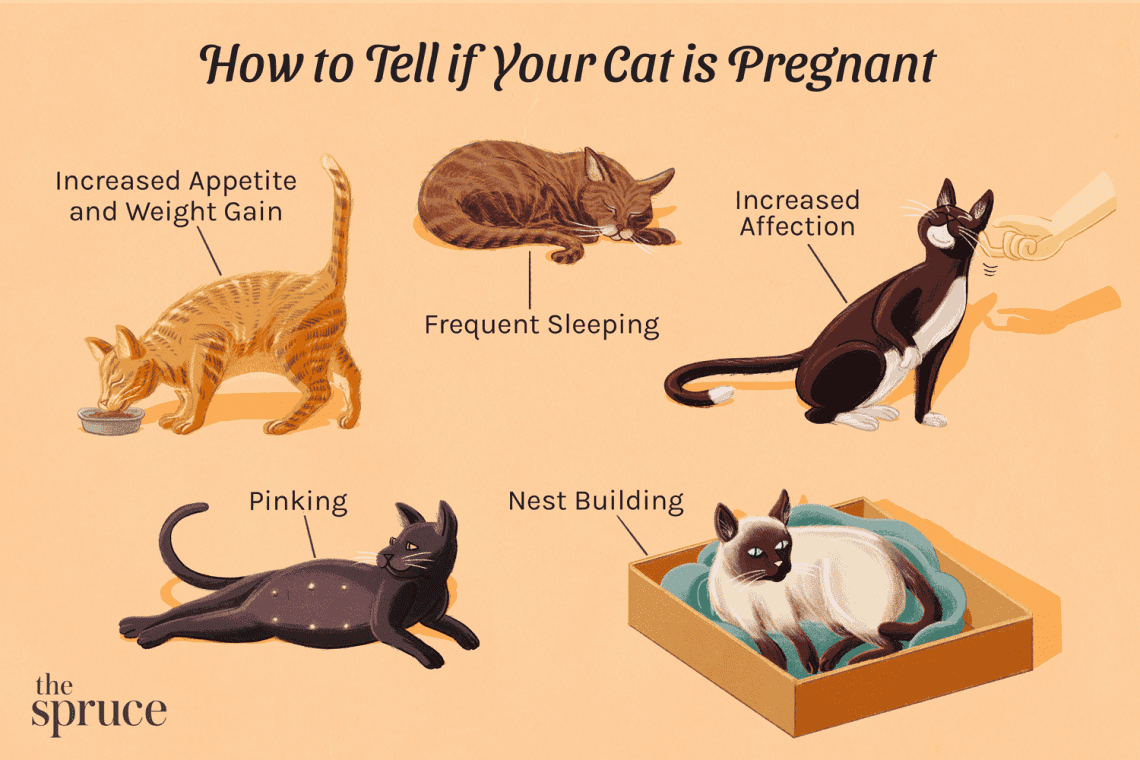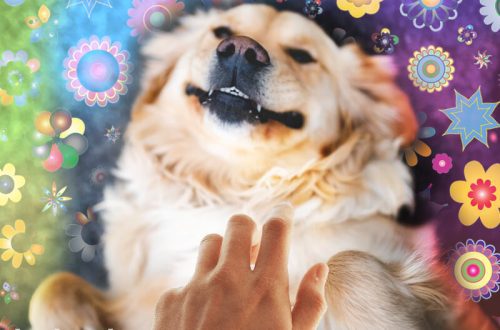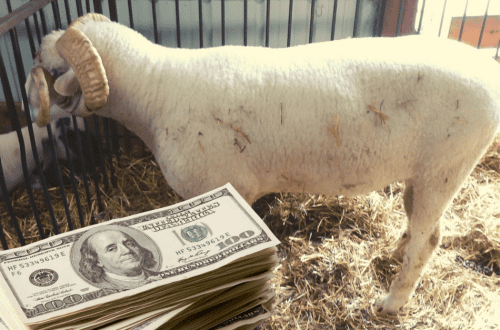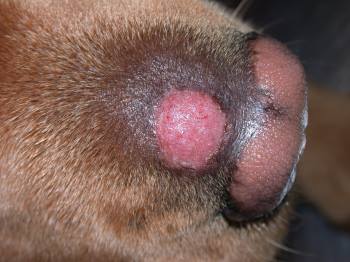
How to know if a cat is pregnant – symptoms and signs of pregnancy in a pet
It is difficult for inexperienced cat owners to understand that their pet is pregnant. But it is advisable to find out about this at an early stage. First of all, this is due to the fact that the process of pregnancy in a cat proceeds very quickly and the owners of the animal need to prepare in time for the birth in order to get healthy offspring.
Today, there are reliable signs of pregnancy in cats, thanks to which it becomes possible to timely identify the symptoms of a piquant condition in an animal. At the same time, for their development, attention, affection and understanding of the future cat mother will be required. But the main thing is to know how to determine if a cat is pregnant?
Contents
Pregnancy in a cat – terms and symptoms
Like a man, a pet must reach puberty before having offspring. It is for this reason that until the pet reaches the age of six months, you should not worry about the appearance of cubs. The first estrus will be the signal that the cat is ready for pregnancy. In addition, the owner of the pet must understand other features of pregnancy in cats.
- Estrus in cats can be observed at regular intervals several times a year. It all depends on whether the cat became pregnant after the first heat or not.
- When estrus occurs, the duration of which varies from 3 to 7 days, the behavior of the animal changes dramatically. Even the calmest pet starts meowing, crawling on the floor, wiping himself on the legs of the owners and other pets living in the apartment, and also rolling from his back to his stomach.
- The behavior of a pet can turn into antics that are not inherent in her – she begins to pursue all moving objects, hitting them with her head from all over, falling on her back and making sounds so loud that they can be heard in neighboring apartments.
- The first few days in the behavior of a cat, inadequacy can be observed, manifested in the refusal to eat, constant meowing in the call, the cat of which, at the first meeting, she will definitely drive away.
- After the first estrus, the chances of pregnancy, even when mating, are so minimal that it makes no sense to wait for the offspring.
- If, after the first estrus, the animal did not become pregnant, then peace and tranquility sets in for several weeks. Then everything repeats again.
Neutering cats possible only after 3-4 heats and, if possible, at least after one birth. In turn, if sterilization is not carried out, then the animal will be capable of reproduction throughout its life, and each time it will have to be checked again and again whether the cat is pregnant.
How to understand that the cat is pregnant?
Animal mating does not lead to pregnancy in all cases females, so when the estrus is over, the owner of the pet will have to figure out how to find out if the cat is pregnant? Moreover, if these are early dates, then determining pregnancy is much more difficult than if it is 3 weeks, but some signs still exist.
- It is necessary to pay attention to the habits of the animal after mating. If the heat does not stop within the next 24 hours, then the cat has not become pregnant. If the discharge has stopped, then, most likely, in the near future it is worth waiting for the offspring.
- Almost all cats during pregnancy turn into affectionate and tame animalsrubbing against their masters.
- When determining the piquant state of an animal, you should not blindly rely on the behavior of a pet. But if cardinal changes in the behavior of the animal are noticed, then you should think about it and contact your veterinarian.
- More precisely, it will be possible to determine pregnancy in a cat 4 weeks after mating. During this period, you can feel certain seals in the lower abdomen of the animal. To do this, press into the lower part of the abdominal region with the fingertips. It is important to do this with maximum tenderness so that there is no miscarriage.
- With the onset of 3 weeks after mating, obvious signs of pregnancy appear: the nipples swell, which acquire a pronounced pink tint, and the mammary gland of the animal is also subject to changes.
- During the same period of pregnancy changing eating behavior in a pet: in most cases, this is manifested by an increase in appetite. In addition, previously favorite foods will not be perceived by the cat, and those that she did not like will become a delicacy.
- In time for 3-5 weeks, the stomach begins to quickly increase and round, and the appetite grows literally by the hour.
- With the onset of the 6th week of pregnancy, formed kittens will begin to be felt in the abdomen. By placing your palm on the animal’s tummy, you can feel the round lumps located on both sides of the middle of the abdomen.
- By 7-8 weeks, the movement of kittens inside the mother’s abdomen begins. You can also feel the head and body of the cubs and feel the beating of small hearts.
- A week before the birth will occur again drastic changes in animal behavior. The cat will begin to scour the apartment in search of a secluded place where you can arrange a cozy nest. At the same time, if you do not take care of a convenient shelter, then your pet will surprise you in the closet or on the owner’s bed.
- 2-3 days before the appearance of kittens, the cat’s nipples sharply increase in size, and colostrum begins to stand out.
- Approximately 10-12 hours before the birth, the cat will hide in the prepared shelter. At the same time, it is very important that no one disturb her, as the stage of preparation for the appearance of kittens is taking place. In such a situation, even the most inattentive owners will understand that their cat is pregnant.
It is possible to check pregnancy at an early stage, perhaps only using ultrasound, and even then it will show the result at 2 weeks after the conception of offspring. At the same time, this is the most optimal time to go to the veterinarian after the first changes in the behavior of a pet have been noticed. In addition, a doctor’s examination will help to find out how many cubs a cat will have. It is very important to understand that if the pregnancy is proceeding normally, then it is not recommended to contact the veterinarian in the later stages.
Features of caring for pregnant cats
A pregnant cat, like a person, demands affection and close attention. Therefore, there are several recommendations for caring for an animal in a piquant position.
- A special diet that plays almost the most important role in caring for pregnant animals.
- Medications that are strictly prohibited for use in cats awaiting replenishment.
- No street – an animal expecting kittens must be kept indoors so that there is no secondary pregnancy, which often occurs in cats from different partners.
- Limited contact of the pet with other animals living in the apartment.
- A secluded secluded place – during pregnancy, your beloved pet will be in constant search for where to retire for relaxation.
- Help, in hygiene, which is due to the rapidly growing tummy of the animal, which does not allow the cat to wash normally.
- Don’t let your cat climb on cupboards or other high surfaces, as she may bring kittens in the most unexpected places.
- Limit your pet with care and attention, she loves it.
Closer to the time the offspring appears, ask for the phone number of the nearest veterinary clinic, whose doctors can arrive on time to help the animal, if needed.
Changes in the behavior of a pregnant cat
In the first week, when a beloved pet becomes pregnant, there may not be any significant changes in her habits, but activity and the animal is often drawn to sleep. At the same time, the animal willingly makes contact with its owners, asks to be caressed and climbs into its arms. There may be an increase in appetite – the animal constantly asks for food, and does so with great perseverance. At 5-7 weeks, an imperceptible movement of kittens in the mother’s stomach begins.
A couple of days before the appearance of kittens, the animal takes special care and attentiveness, starting to lick the owners or other inhabitants of the apartment in every possible way showing the experience for them. Naturally, such changes are not inherent in all cats, which is primarily due to the individual characteristics of the animal. On the day when childbirth occurs, the pet becomes restless, not finding a place for itself.





